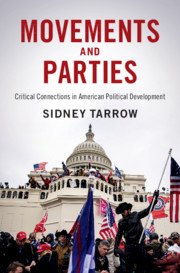Dynamics of Contention
Part of Cambridge Studies in Contentious Politics
- Authors:
- Doug McAdam, Stanford University, California
- Sidney Tarrow, Cornell University, New York
- Charles Tilly, Columbia University, New York
- Date Published: January 2005
- availability: This ISBN is for an eBook version which is distributed on our behalf by a third party.
- format: Adobe eBook Reader
- isbn: 9780511028779
Find out more about Cambridge eBooks
Adobe eBook Reader
Other available formats:
Paperback, Hardback
Looking for an examination copy?
This title is not currently available for examination. However, if you are interested in the title for your course we can consider offering an examination copy. To register your interest please contact [email protected] providing details of the course you are teaching.
-
Dissatisfied with the compartmentalization of studies concerning strikes, wars, revolutions, social movements, and other forms of political struggle, McAdam, Tarrow, and Tilly identify causal mechanisms and processes that recur across a wide range of contentious politics. Critical of the static, single-actor models (including their own) that have prevailed in the field, they shift the focus of analysis to dynamic interaction. Doubtful that large, complex series of events such as revolutions and social movements conform to general laws, they break events into smaller episodes, then identify recurrent mechanisms and proceses within them. Dynamics of Contention examines and compares eighteen contentious episodes drawn from many different parts of the world since the French Revolution, probing them for consequential and widely applicable mechanisms, for example, brokerage, category formation, and elite defection. The episodes range from nineteenth-century nationalist movements to contemporary Muslim-Hindu conflict to the Tiananmen crisis of 1989 to disintegration of the Soviet Union. The authors spell out the implications of their approach for explanation of revolutions, nationalism, and democratization, then lay out a more general program for study of contentious episodes wherever and whenever they occur.
Read more- Broad, comparative survey of 15 highly varied cases of political contention drawn from around the world
- Offers general dynamic framework for analyzing contentious politics
- Integrates structuralist, culturalist and rationalist approaches to the study of contention
Reviews & endorsements
'Dynamics of Contention - written by three of the leading scholars of social movements and 'contentious politics' - is undoubtedly the most ambitious, and arguably the most important, book on social movements (and related phenomena) written in the past two decades.' Sociology
Customer reviews
Not yet reviewed
Be the first to review
Review was not posted due to profanity
×Product details
- Date Published: January 2005
- format: Adobe eBook Reader
- isbn: 9780511028779
- contains: 12 b/w illus. 3 tables
- availability: This ISBN is for an eBook version which is distributed on our behalf by a third party.
Table of Contents
Part I. What's the Problem?:
1. What are they shouting about
2. Lineaments of contention
3. Comparisons, mechanisms, and episodes
Part II. Tentative Solutions:
4. Mobilizations in comparative perspective
5. Contentious action
6. Transformations of contention
Part III. Applications and Conclusions:
7. Revolutionary trajectories
8. Nationalism, national disintegration, and contention
9. Contentious democratization
10. Conclusions.
Sorry, this resource is locked
Please register or sign in to request access. If you are having problems accessing these resources please email [email protected]
Register Sign in» Proceed
You are now leaving the Cambridge University Press website. Your eBook purchase and download will be completed by our partner www.ebooks.com. Please see the permission section of the www.ebooks.com catalogue page for details of the print & copy limits on our eBooks.
Continue ×Are you sure you want to delete your account?
This cannot be undone.
Thank you for your feedback which will help us improve our service.
If you requested a response, we will make sure to get back to you shortly.
×



















